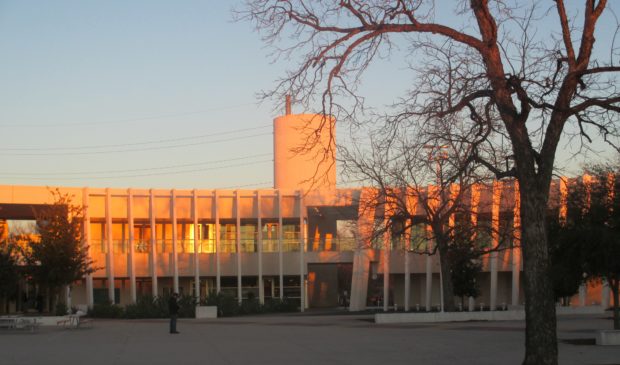City pauses arts program amid protests, possible MACC opt-out
Thursday, March 1, 2018 by
Chad Swiatecki The city has paused a program intended to create much-needed venue space for local arts groups amid controversy and concern over how it would mesh with cultural groups that operate out of city cultural centers.
Laura Esparza, manager of museums and cultural programs for the Parks and Recreation Department, informed the Arts Commission on Monday that city administrators had decided to put on hold the Artists Access Program, which was created to allow arts groups to use three underutilized ethnic cultural centers and Dougherty Arts Center.
That move came because of objections from arts groups in residence at the Emma S. Barrientos Mexican American Cultural Center, who questioned the contract that would have grandfathered them into the new program and allowed them to continue practicing and performing at the facility.
The city’s decision means 15 arts groups that had applied to the Artists Access Program and hoped to have more options for practice and performance space soon will have to wait until at least July, when the program is expected to be revamped and put in place.
Esparza told arts commissioners that the parks department and a board made of representatives from the city’s cultural commissions would spend March conducting at least three public feedback sessions on how to possibly restructure the program. It is expected the next application period would begin in April.
The program would have provided $240,000 over two years from Hotel Occupancy Tax funds to pay for staff time to keep the centers – including the Asian American Resource Center and the George Washington Carver Museum, Cultural and Genealogy Center – open in the evenings to accommodate use by arts groups that are increasingly being priced out of existing privately owned spaces. It was proposed by the Austin Creative Alliance and a product of the Music and Creative Ecosystem Omnibus that City Council passed to help local artists and musicians find more ways to earn a living.
John Riedie, chief executive officer of ACA, said the decision to put the program on hold adds pressure to the arts groups that applied, including four that had performance times scheduled and had to scramble to find other options.
“Delaying this program means productions that would have happened from March through June won’t,” he said. “The result is fewer jobs and less income for theater artists in an already tough environment.”
The resistance from Latino theater groups and the MACC’s advisory board has reached a point that the board nearly voted at its February meeting to withdraw from the program completely. Instead, the board opted to wait a month to determine if there would be any financial or legal consequences to opting out of the city program.
The primary concern comes over the possibility that groups with programming that doesn’t involve Latino culture could wind up performing there, creating a conflict with the center’s stated purpose of celebrating the Latino communities of Austin.
Currently, there is no calendar availability outside of the three Latino resident theater groups booked into MACC through the fall of 2019.
“The question is, who are these groups who want to use the center?” said Herlinda Zamora, the culture and arts education manager at MACC. “Is there a threat that they would want to showcase something else? It’s become a territorial thing with the current users of the space.”
Juan Oyervides, an advisory board member, said he and others on the board mostly want to know what consequences the facility could face if the board opts to not participate in the access program.
“It’s a poor fit (with) the mission of MACC (because) it was something created to promote the presence of Latino cultural arts and usage by that community,” he said. “If all of the sudden you change the mission and what’s going on there, then it’s not fulfilling its mission for being created. We were already on the verge of opting out, but first we want to hear the consequences and what might happen if we make that decision to opt out.”
Photo by Billy Hathorn (assumed based on copyright claims). [CC BY-SA 3.0 or GFDL], via Wikimedia Commons.
The Austin Monitor’s work is made possible by donations from the community. Though our reporting covers donors from time to time, we are careful to keep business and editorial efforts separate while maintaining transparency. A complete list of donors is available here, and our code of ethics is explained here.
You're a community leader
And we’re honored you look to us for serious, in-depth news. You know a strong community needs local and dedicated watchdog reporting. We’re here for you and that won’t change. Now will you take the powerful next step and support our nonprofit news organization?










